The impact of social factors on global health
(image courtesy of Dey / Flickr)
Polio. Malaria. Tuberculosis. These are all illnesses that the World Health Organization normally focusses on. But, the WHO is now broadening its focus considerably. It aims to tackle social ills, like poverty, powerlessness, and unemployment, that determine people’s health. Lisa Mullins speaks with Sir Michael Marmot, an Epidemiologist at University College in London and chair of the WHO’s Commission on Social Determinants of Health.
"Social injustice is killing people on a grand scale," says Sir Marmot.
"There are two ways to look at these social inequalities and their consequences for ill health. One is to look at the differences among countries. When we see that a woman in a sub-Saharan African country has a life expectancy of 40, and a woman in Japan has a life expectancy of 86, we call this ‘major avoidable inequality.’
"Second, we look within countries, and you ask where do we see the inequalities? Everywhere. And the important thing about our report is that pointed not only to the difference between people at the bottom and people everywhere else, but the fact that people in the middle have worse health than the people at the top, but better health than those at the bottom. It runs right across the whole of society."
PRI’s "The World" is a one-hour, weekday radio news magazine offering a mix of news, features, interviews, and music from around the globe. "The World" is a co-production of the BBC World Service, PRI and WGBH Boston. More "The World."
Every day, reporters and producers at The World are hard at work bringing you human-centered news from across the globe. But we can’t do it without you. We need your support to ensure we can continue this work for another year.
Make a gift today, and you’ll help us unlock a matching gift of $67,000!
